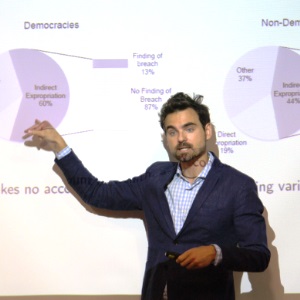Venue
Start
End
Speaker(s)/Moderator(s)
What Explains Claimants’ Low Success Rate in Investor-State Disputes?
Introduction

The treatment of foreign investment has become among the most controversial issues in global governance. A host of major trade agreements are currently in jeopardy over their investment provisions. At the centre of the controversy lies the mechanism of investor-state dispute settlement (ISDS), which allows private companies to bring legal claims against a host government. If the government’s actions are found to have degraded the company’s investment in breach of an investment treaty, the company can be awarded financial compensation. The mechanism of ISDS is far from new: it emerged during the postcolonial era as a way of protecting Western investors from expropriation and nationalization by governments in countries with weak rule of law. But only in recent years has it generated this level of contention.
In response, policy makers frequently point out that investors lose most of the claims they bring, and that ISDS thus poses little true threat to legitimate government measures. Yet this leads to an overlooked puzzle: why would investors continue to file these costly cases, if the expected success rate is so low? A closer look at the data shows that current estimates actually overstate investors’ success rates, especially when it comes to specific types of legal claims. What is more, this rate of success has been dropping precipitously—the opposite trend to what we might expect of a maturing legal system, as expectations over what constitutes a violation converge over time.
This puzzling pattern is most pronounced in the fastest rising type of claim filed by investors: indirect expropriation claims. And these claims are less likely to both result in early settlement and succeed at the award stage. Krzysztof Pelc argued that these parallel trends may be due to a rise in strategic litigation by investors, where the aim is not only to obtain compensation, but also to deter governments’ regulatory ambitions.
Presentation
Download Krzysztof Pelc’s presentation in PDF format
About the Speaker
Krzysztof Pelc is William Dawson Scholar and Associate Professor in the Department of Political Science at McGill University. He obtained his PhD from Georgetown University in 2009. His research examines the international political economy, with a focus on the international rules of trade and investment. He is interested in how the design of rules affects odds of cooperation between states and how some rules may benefit some actors over others. His interests have led him to write about participation in institutions, privacy and publicity, the effects of perceived (il)legitimacy on political outcomes, optimal ambiguity, the impact of hard times on cooperation, precedent in international public law, and the circumstances under which actors are allowed to suspend formal rules. This research has appeared in International Organization, American Political Science Review, Journal of Politics, World Politics, British Journal of Political Science, and Journal of International Economic Law, among others. His recent book, Making and Bending International Rules: The Design of Exceptions and Escape Clauses in Trade Law (Cambridge Press, 2016), brings together some of the main points of this research agenda. The book examines how international rules deal with unexpected events.

